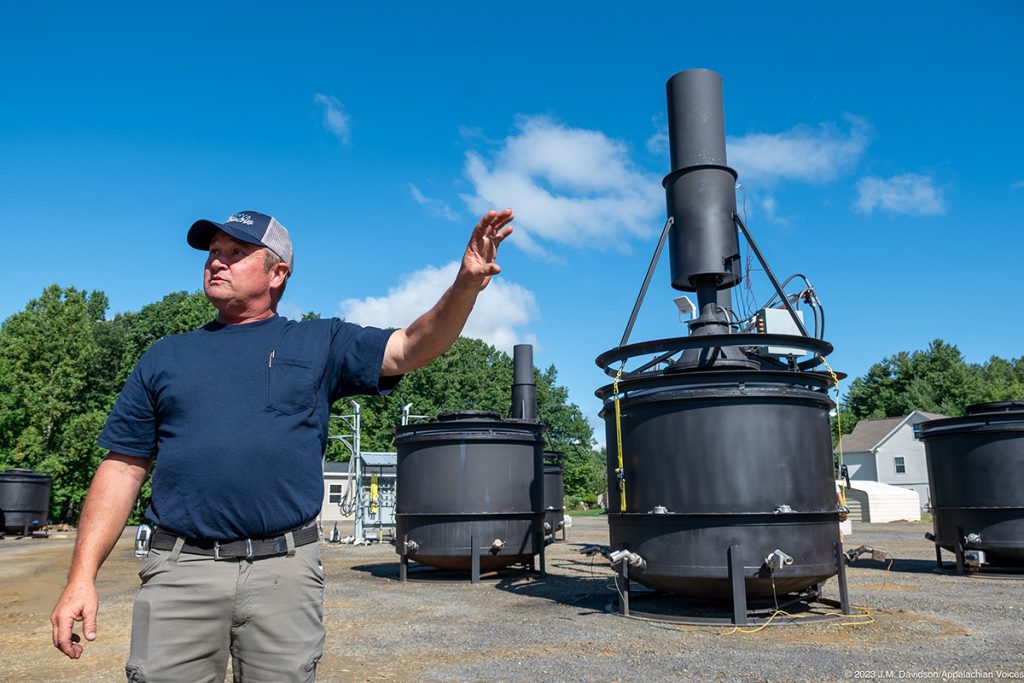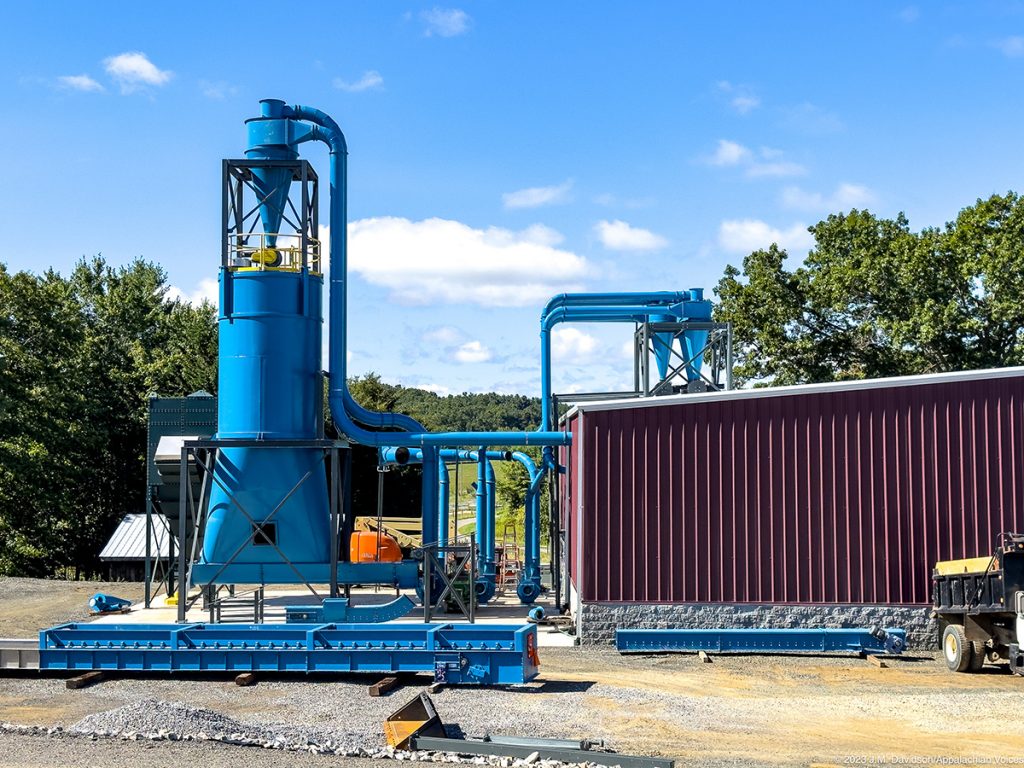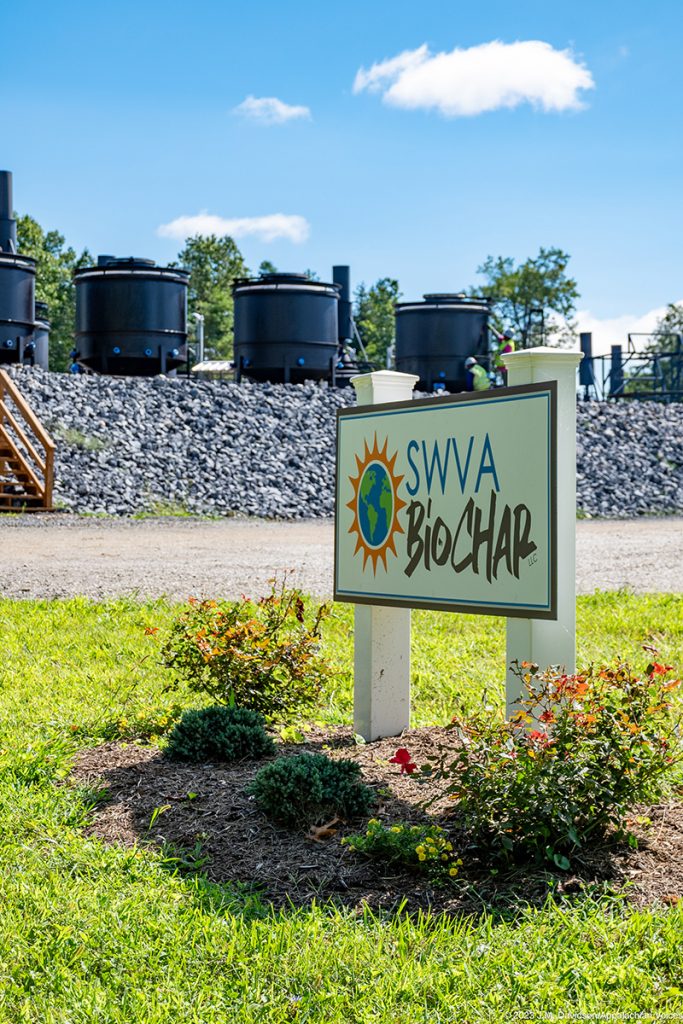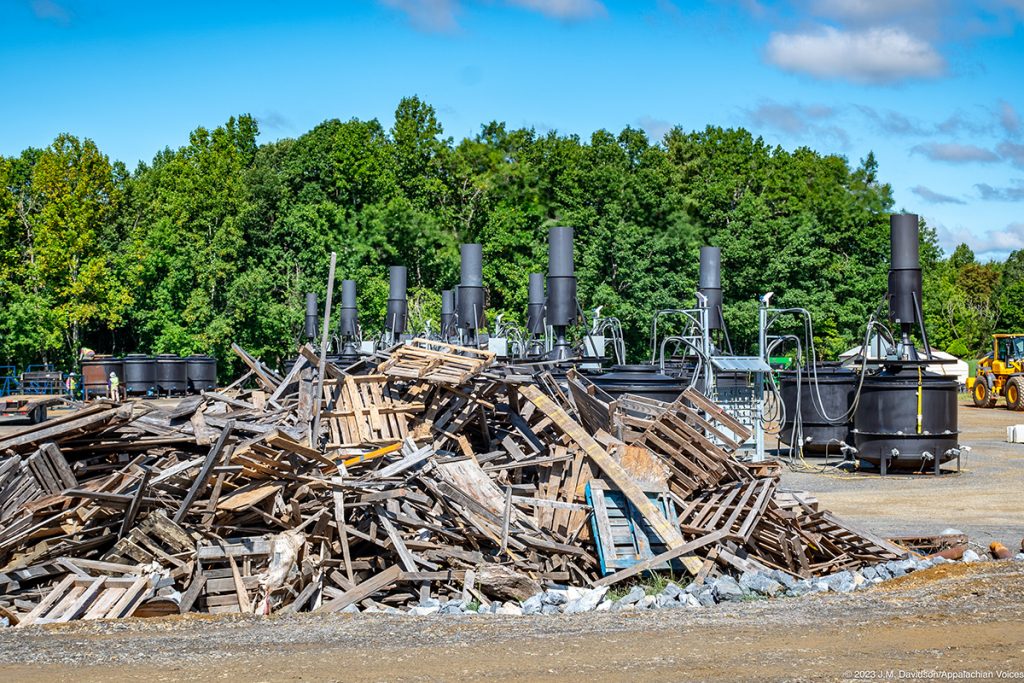‘Every Stick’: SWVA Biochar Uses Local Waste to Create Quality Soil
By Carl Blankenship
When Jeff Wade and Jack Wall landed in Colorado in 2021, they were hoping to buy a single piece of equipment, but returned with the foundation of a multi-million dollar project.
The pair went to Berthoud, Colorado, to take a look at technology developed by Biochar Now — kilns that turn waste wood into clean charcoal with no notable emissions.
Wall and Wade are neighbors back in Floyd, Virginia. The pair have a long-shared interest in regenerative agriculture and run cattle and sheep together.
Wall is a longtime environmentalist and founder of Floyd Eco Village, a 75-acre site housing an event venue sustainable gardens, farms and woods. Wade’s family has lived and farmed in Floyd County for generations.
They saved all the manure from its animals and ran chickens in the yard for fertilizer, and his grandfather would even use scraps from trout he caught fishing to fertilize corn. When his family slaughtered hogs during the Thanksgiving season, nothing went to waste.
The pair became interested in producing biochar — a generic term for charcoal derived from natural waste products in low-oxygen environments — because of its potential uses in agriculture while maintaining a carbon-negative footprint.
“We were studying how to optimize our fields, our land, our soil,” Wall says. “And we knew that biochar was a way to help with that.”
Wade, who has a background in fabrication, had begun building a home-brew biochar kiln, but the pair decided to produce it on a larger scale and were turned on to Biochar Now’s technology.
Wade explains that they visited the company’s Colorado site with the intention of purchasing one of its vacuum kilns, but the plan changed after they met Biochar Now CEO James Gaspard.
“When we got there we realized James wasn’t really in the business of just selling a kiln,” Wade says. “We ended up spending the day with him, just looking around, and were really impressed with the technology, impressed with James.”
One kiln turned into 30, with the first arriving in Floyd in 2022. Wall became LLC manager and Wade stepped in as general manager of the newly-formed SWVA Biochar. Biochar Now holds 25% ownership of the operation, which is a couple-hundred feet from Wade’s doorstep on a site filled with equipment he describes as “looking like it came from outer space.”
The kilns chug along every day, intense heat shimmering over their special emission-control stacks, fed with a steady stream of waste wood. The company has sourced wood from scraps and stumps at local logging sites, railroad ties and even the old FloydFest site that was torn down.
What is this stuff?
There’s no regulation standard for biochar, and the quality can vary significantly depending on the process.
But the basic requirements are a natural material and pyrolysis, a chemical process that occurs when a material is exposed to high temperatures under specific circumstances.
Biochar Now touts the quality of its process: A vacuum-sealed kiln uses a small amount of oxygen to begin a chemical reaction that reaches temperatures of 1,200 degrees Fahrenheit for hours on end, annihilating the chemical bonds of the wood inside. The company’s technology carries certifications from the U.S. Environmental Protection Agency and the U.S. Department of Agriculture. According to Gaspard, BioChar Now’s CEO, the process produces a pure, highly absorbent carbon material.
That the process works and checks out environmentally may sound far-fetched, but according to regulators and researchers, it does.
SWVA Biochar is exempted from Virginia’s air emissions permitting process. According to an intra-agency memo acquired from the state’s Department of Environmental Quality, the site’s measured output of common particulates and pollutants falls well below the requirements for permitting.
“I mean, we’re producing less pollution than a diesel truck that’s going down the highway,” Wall says. “It’s just nothing.”
Wade states that he only notices the kilns when they start up and they sometimes emit a pleasant, woody smell.
The process can even destroy the chemical treatments applied to railroad ties and still produce usable biochar. Biochar Now was featured in USDA research on the topic in 2020. The company pyrolyzed creosote-soaked ties under one heating protocol and a USDA facility pyrolyzed them under a different protocol to compare results. The case study found the higher-heat protocol produced biochar suitable for use in soil — and Gaspard says Biochar Now’s kilns are run at a higher temperature to break down creosote when they are fed with rail ties.
Research into applications for biochar is an exploding field. It is well-documented that quality biochar can improve damaged or highly acidic soils. Biochar is not a fertilizer, but it holds water, nutrients and microbial life. It can improve soil health in the long run.
It’s also carbon negative because it is a stable material that can be buried in soil, removing it from the carbon cycle for potentially thousands of years.
The material produced via Biochar Now’s process is also a competitor to granulated activated carbon used in drinking water filtration, and biochar has potential to supply carbon to industries like battery manufacturing. Wade noted some of SWVA BioChar’s product is being used as a component in tree-seed incubation balls.
Sights on expansion
Wall said Biochar Now’s equipment and processes produce a quality material, but the problem SWVA ran into once it had the kilns on site was efficiently processing what they had produced. The biochar needs to be broken apart and filtered through screens to size it for different applications. SWVA BioChar spent over a year — from about September 2022 to November 2023 — working with engineers to design and build an automated system for processing the raw material from the kilns. The material is now crushed and run through screens with suction to separate the pieces by size.
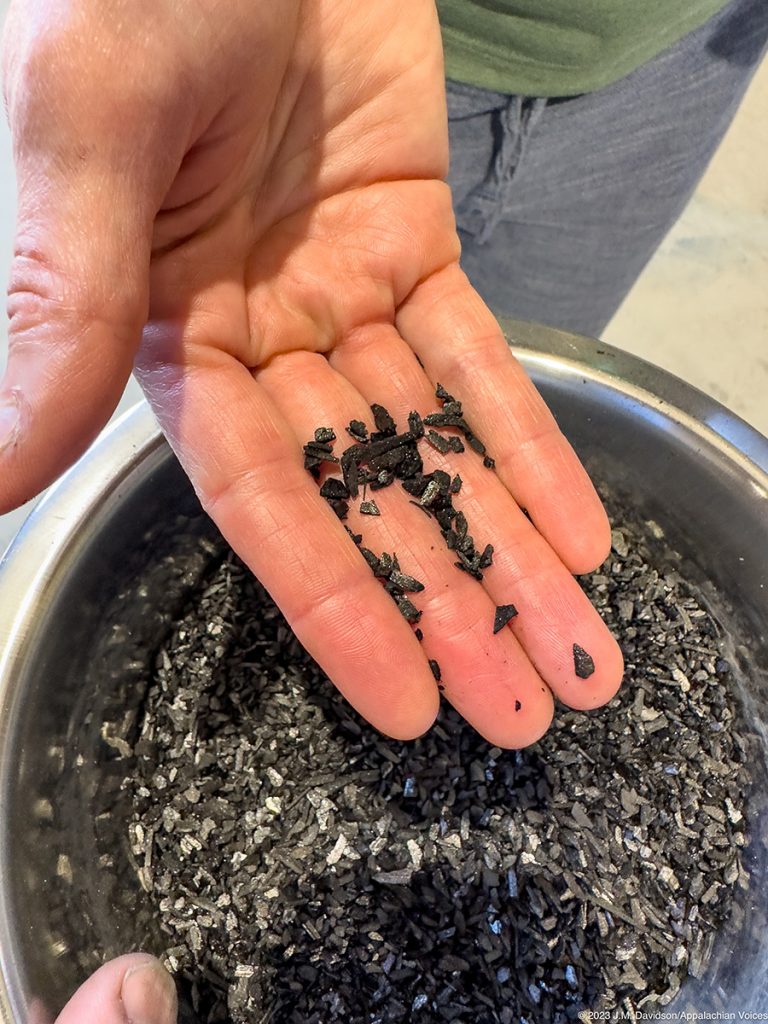
Biochar is crushed and run through screens with suction to separate the pieces by size. Photo by Jimmy Davidson
If the operation is run at full steam, it would be able to produce about 4,000 tons of biochar every year. As it stands, it is churning out about a third of its maximum capacity as the company looks to scale up the number of shifts, make biochar around the clock and expand into composting. According to Wall, there is more local waste material than his outfit can process.
SWVA BioChar is looking to expand and produce compost out of waste material. The company is eligible for a grant via a USDA program aimed at expanding domestic fertilizer production, which would offset the cost of a $6 million expansion.
As of publication in April, SWVA BioChar is actively bidding on sites. Once a new site is secured, it has to undergo an environmental review. The review, which is common practice for USDA grants, requires studies on any adverse effects a project could cause and requires the project complies with a laundry list of environmental laws. SWVA BioChar would also be required to implement stormwater management and prevent runoff from the site.
SWVA BioChar expects to be reimbursed for 48% of the cost of any equipment it buys for the project if it finds a qualified site. That would help pay for 30 more biochar kilns and composting equipment like aerators powered by onsite renewables.
According to Wade, the company hopes to start producing compost by late summer and ramp up to 25,000 tons of compost each year.
The company is testing its biochar as a ground cover at poultry farms, where it could be an important part of the composting mix. It can take years for microbe and nutrient loads in biochar to make a difference in the soil it is applied to, but the company plans to sell biochar to chicken farms as litter before buying it back loaded with nutrients that feed microbial activity. This would allow it to make a greater impact on soil health sooner.
There is a growing body of literature on using biochar to control pollution on poultry farms. The carbon may also improve the health of poultry birds when used as a feed supplement.
Wall explains that the litter is highly concentrated and would be diluted with food waste, leaves, wood shavings and other organic components before spending weeks composting. Wall said the move to running a composting operation would allow the company to use “every stick” of waste wood it can get.
The Biochar Now process works well for waste wood like stumps, but a large amount of waste is not suitable for the kilns. A grinder in SWVA BioChar’s grant application changes that equation.
“Half of [the waste wood] will go to making biochar; half of it will go to make the wood shavings we need to make compost out of,” Wall says, adding that many government entities aim to reduce waste entering landfills.
Floyd County Administrator Linda Millsaps shares that the county has had several conversations about diverting more of its wood products from the county waste stream to SWVA Biochar. The EPA estimates 8.3% of landfill waste in the United States is waste wood. Floyd County — with a budget just shy of $22 million — spends up to $960,000 on tipping fees every year.
SWVA BioChar is currently taking about 10% of the county’s waste products and all the brush dropped at its transfer station. Millsaps describes the brush diversion as a “huge win.”
“Our transfer station can’t take brush, which often leads to dumping or burning,” Millsaps says.
In the immediate future, Wall and Wade are hoping to add a second shift and make biochar around the clock. Fully staffed, the operation would employ about 15 local people and reach its 4,000-ton per-year goal.
Jeff Wade has applied biochar to part of his land as a topical dressing to try and improve the soil on his farm, but he does not expect immediate benefits. For people intending to use biochar to enhance the fertility of their soil, he noted it takes time for the material to work its way down to the root base layer, load it with nutrients and develop microbial life, but it can benefit soil that struggles to hold on to water in a home garden.
Wade applied biochar to a section of his wife’s backyard garden, about 20 by 40 feet, and deliberately tilled the charcoal deeper into the soil. He noticed an immediate benefit — the untreated area dried out in the sun, but the section with biochar retained water for days.
Biochar can have both drawbacks and benefits in the garden. A fact sheet from Washington State University outlines that biochar can decrease soil bulk density, improve aeration and improve fungal life with no drawbacks, but it can also cause waterlogging, increase soil alkalinity to unhealthy levels and reduce the effectiveness of pesticides, depending on how it is used.
The fact sheet advises that only a small amount of biochar should be used in the soil, only commercially produced biochars should be used in gardens, and that plants should be monitored for short-term nitrogen deficiency.
The post ‘Every Stick’: SWVA Biochar Uses Local Waste to Create Quality Soil appeared first on Appalachian Voices.
Protecting the Central and Southern Appalachian Mountain Region
Source: https://appvoices.org/2024/05/15/swva-biochar/
Anyone can join.
Anyone can contribute.
Anyone can become informed about their world.
"United We Stand" Click Here To Create Your Personal Citizen Journalist Account Today, Be Sure To Invite Your Friends.
Lion’s Mane Mushroom
Mushrooms are having a moment. One fabulous fungus in particular, lion’s mane, may help improve memory, depression and anxiety symptoms. They are also an excellent source of nutrients that show promise as a therapy for dementia, and other neurodegenerative diseases. If you’re living with anxiety or depression, you may be curious about all the therapy options out there — including the natural ones.Our Lion’s Mane WHOLE MIND Nootropic Blend has been formulated to utilize the potency of Lion’s mane but also include the benefits of four other Highly Beneficial Mushrooms. Synergistically, they work together to Build your health through improving cognitive function and immunity regardless of your age. Our Nootropic not only improves your Cognitive Function and Activates your Immune System, But it benefits growth of Essential Gut Flora, further enhancing your Vitality.
Our Formula includes:
Lion’s Mane Mushrooms which Increase Brain Power through nerve growth, lessen anxiety, reduce depression, and improve concentration. Its an excellent adaptogen, promotes sleep and improves immunity.
Shiitake Mushrooms which Fight cancer cells and infectious disease, boost the immune system, promotes brain function, and serves as a source of B vitamins.
Maitake Mushrooms which regulate blood sugar levels of diabetics, reduce hypertension and boosts the immune system.
Reishi Mushrooms which Fight inflammation, liver disease, fatigue, tumor growth and cancer. They Improve skin disorders and soothes digestive problems, stomach ulcers and leaky gut syndrome.
Chaga Mushrooms which have anti-aging effects, boost immune function, improve stamina and athletic performance, even act as a natural aphrodisiac, fighting diabetes and improving liver function.
Try Our Lion’s Mane WHOLE MIND Nootropic Blend 60 Capsules. Today Be 100% Satisfied Or Receive A Full Money Back Guarantee Order Yours Today By Following This Link.




